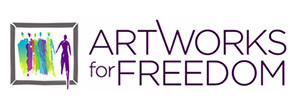In our Freedom Q&A series, we interview artists, NGO leaders, academics, students, grassroots activists and others around the world who are using their voices and creative skills to fight human trafficking.
This week, we hear from Kendis Paris, executive director and co-founder of Truckers Against Trafficking.
 Can small acts make a difference in the fight against human trafficking? KENDIS PARIS, executive director and co-founder of the U.S.-based nonprofit Truckers Against Trafficking (TAT), thinks so. Currently an Ashoka U.S. fellow for her leadership in the anti-trafficking movement, Kendis co-founded TAT as a way to empower members of the truck driving industry to make a difference in stopping modern-day slavery, specifically sex-trafficking.
Can small acts make a difference in the fight against human trafficking? KENDIS PARIS, executive director and co-founder of the U.S.-based nonprofit Truckers Against Trafficking (TAT), thinks so. Currently an Ashoka U.S. fellow for her leadership in the anti-trafficking movement, Kendis co-founded TAT as a way to empower members of the truck driving industry to make a difference in stopping modern-day slavery, specifically sex-trafficking.
As she sees it, small acts of resistance, when strategically directed, collectively add up to large change – the kind of change Kendis thinks TAT can achieve. Sex trafficking frequently operates in places truck drivers intersect with along our U.S. highway system. By educating drivers and truck stop employees about trafficking, as well as equipping them to report suspicious activity when they see it, TAT is mobilizing one of the most important communities to the anti-trafficking fight. Further, by instilling a belief that truck drivers’ actions do make a difference, TAT is helping the industry embrace its leadership role in the overall effort to end the gross exploitation of people being trafficked.
In our Freedom Q&A, Kendis offers inspiring words on why it is important that every person find some way to act toward human trafficking’s end…and why small acts do make a difference.
Why is the fight against human trafficking something that everyone should be involved in?
Traffickers count on ignorance and/or hopelessness. They either want people to pay the issue no mind at all and just keep thinking that the woman on the street corner is “just a prostitute” or that the field worker picking their tomatoes makes a living wage, if they think of him at all. Conversely, for those who do become aware of human trafficking, they want the problem to seem too dark and too overwhelming – for all to believe that there is nothing that can be done. If this is what they’re counting on, then little acts of resistance to the cultural norms that traffickers exploit on a daily basis do matter.
Something as simple as changing your language paradigm – in particular around the use of the over-glorified word “pimp” – and having honest conversations with your friends about what a pimp really is starts a necessary cultural shift. Or what about taking a second look at where the products you buy come from in order to start financially supporting companies who are paying attention to their supply chains? Or perhaps creating a safe space for your daughter’s vulnerable friend, so she knows she doesn’t have to hit the streets when things get bad at home? If we do not resist the cultural norms that allow traffickers to operate freely across our country, then we are complicit in allowing this crime to flourish.
At ArtWorks for Freedom, we believe everyone has a creative gift they can contribute to the fight against human trafficking. What skill, talent or gift do you believe you bring to this fight?
I am my mother’s daughter. She came up with the original idea for TAT, and she instilled in my sisters and me not only a great work ethic, but a deep passion for social justice and a tenacity for doing a job well.
What is one thing you think every anti-trafficking activist needs to know to be effective?
Learn how to say no to some things so that you can say a greater yes to others. Mission drift is deadly and good intentions without a solid infrastructure and clear vision of where you need to go are ineffective.
Is there a time when you became emotionally overwhelmed as an anti-trafficking activist? How did you overcome that difficulty?
The nature of my job requires case-knowledge, and from time-to-time certain stories will come across my desk that rip my heart anew. One that I recall was about a pimp who had been in 12 foster homes growing up…beaten and sexually abused all throughout his childhood, turning to pimping as a young adult…and the realities of what he endured, and the ways he then inflicted the same things on his victims were all horrific. The cyclical darkness can feel overwhelming. In times like these I pray, I remind myself (or shout aloud) the truths of Scripture and that the world will not always be this way, and I take comfort in the fact that I also am forgiven.
What advice would you give someone who wants to do something to eradicate human trafficking but doesn’t know how to get started?
Beyond the little acts of resistance I mentioned above, if you have desire to do targeted work on an organizational level, there is an incredible need for national organizations to rise up and work with the bus industry and taxi drivers. To my knowledge, no organizations are currently working with them on a national level, and yet, like trucking, we are talking about other front line workers who see things most do not. Imagine if they could be mobilized to combat human trafficking? TAT has a working model that could be replicated in these other industries and a series of best practices to follow. If you have the capacity and means, please contact me at tat.truckers@gmail.com.
***
Watch the video below to learn more about human trafficking at truck stops.



Leave a Reply
Want to join the discussion?Feel free to contribute!